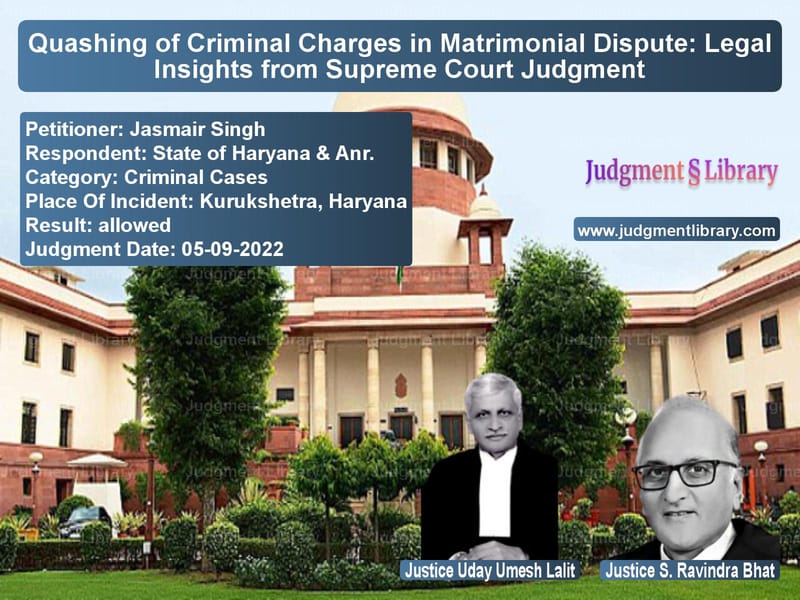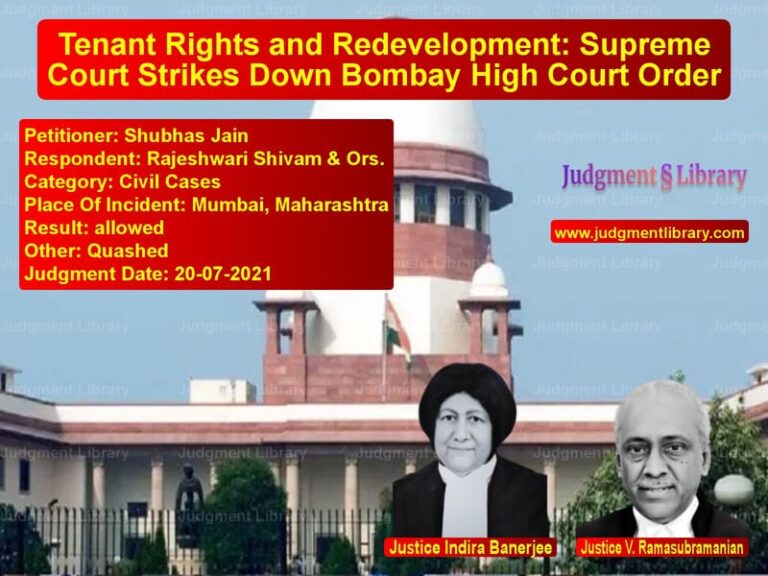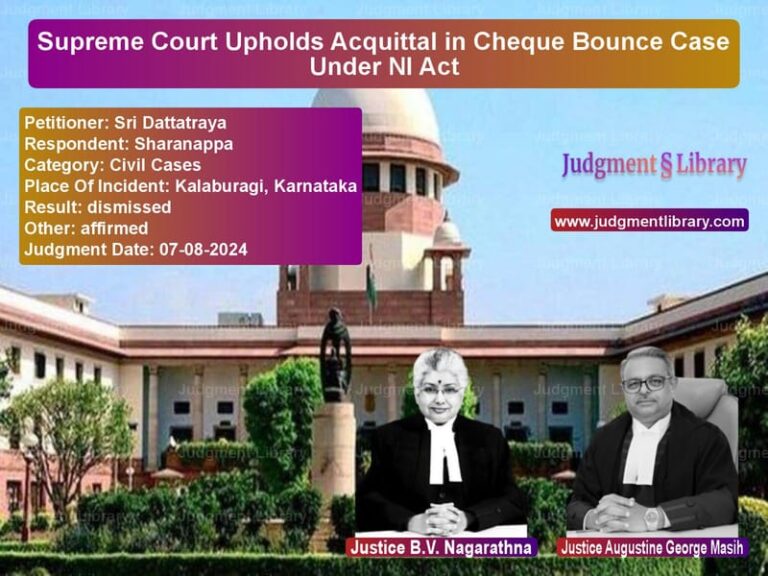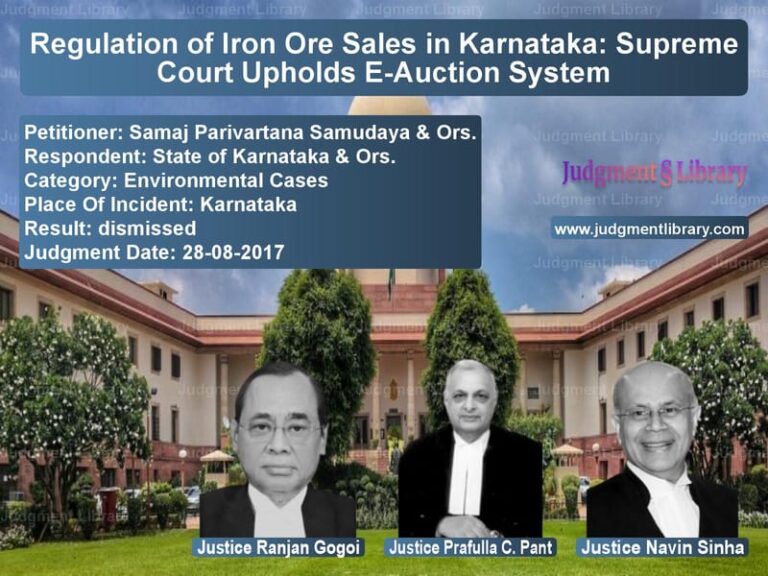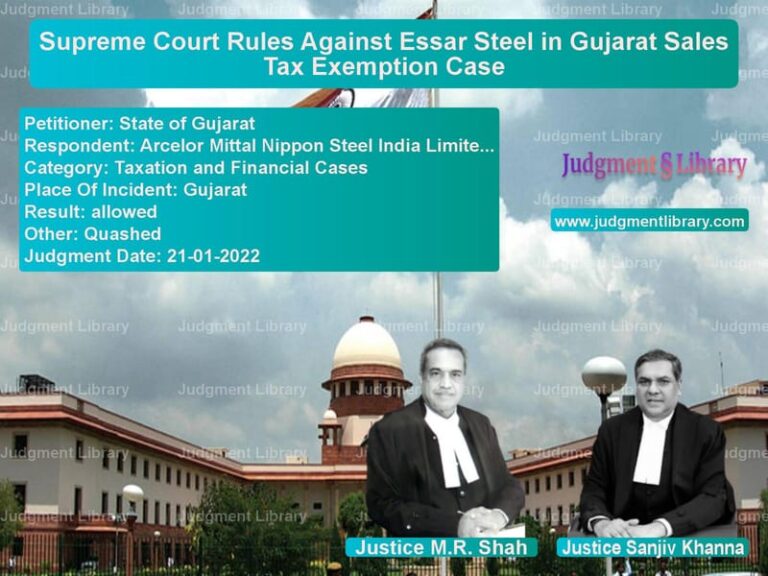Quashing of Criminal Charges in Matrimonial Dispute: Legal Insights from Supreme Court Judgment
This Supreme Court case revolves around a matrimonial dispute, where the appellant, Jasmair Singh, sought the quashing of criminal charges filed against him in connection with an FIR lodged on 14.02.2016. The charges included Sections 323 (voluntarily causing hurt), 406 (criminal breach of trust), 498-A (cruelty by husband or his relatives), and 506 (criminal intimidation) of the Indian Penal Code (IPC). These charges were brought against the appellant by his wife, respondent no. 2, in the district of Kurukshetra, Haryana. The appellant had filed a petition under Section 482 of the Criminal Procedure Code (Cr.P.C.) to quash the proceedings after reaching a settlement with the respondent wife.
The crux of the matter lies in the settlement that both parties entered into on 23.12.2021, which led to the filing of the petition for quashing the FIR. The appellant’s appeal was prompted by the High Court’s refusal to quash the proceedings despite the settlement. The Supreme Court, in its decision on 05.09.2022, examined the circumstances surrounding the settlement and whether it warranted quashing the criminal case.
Background of the Case
The appellant and the respondent had been involved in a long-standing matrimonial dispute, which had escalated to the point of criminal proceedings. The charges levied against the appellant included accusations of causing harm to the wife, engaging in criminal breach of trust, subjecting her to cruelty, and intimidating her. The case was filed in 2016 after the wife’s complaints against her husband and his relatives. However, both parties eventually reached a settlement, resolving their issues, and the wife agreed to withdraw her allegations.
The settlement, known as the Memo of Compromise, was filed on 23.12.2021. In accordance with the settlement, the appellant filed an application under Section 482 of Cr.P.C. before the High Court, seeking to quash the FIR and the charges against him. Despite the settlement and the mutual agreement between the parties, the High Court refused to quash the proceedings, prompting the appellant to approach the Supreme Court.
Petitioner’s Arguments
The appellant, represented by his counsel, argued that the parties had amicably settled their differences, and the wife had no further interest in pursuing the criminal charges. The appellant’s counsel cited the ruling in *Gian Singh v. State of Punjab* (2012), which established that in cases where the parties have settled their differences and the continuation of the proceedings would cause undue hardship, the court could exercise its power under Section 482 of the Cr.P.C. to quash the proceedings. The appellant contended that the case at hand was a clear instance where such jurisdiction should be exercised due to the settlement and the wife’s desire to move on from the matter.
Furthermore, the appellant’s counsel stressed that the continuation of the criminal case would serve no useful purpose, as the core of the dispute had been resolved and the allegations had been retracted by the wife. The appellant argued that allowing the proceedings to continue would only result in unnecessary legal battles and further strain on both parties.
Respondent’s Arguments
The respondent, represented by her counsel, did not oppose the settlement per se but contested the appellant’s request to quash the proceedings. The respondent’s counsel emphasized that while the parties had reached a settlement, the criminal charges in question were serious, and the state had an interest in prosecuting such matters to maintain public order. The counsel for the respondent expressed concerns that allowing the quashing of the FIR would set a precedent that could encourage the settlement of serious criminal offenses, which could undermine the legal system’s role in ensuring accountability for such acts.
Court’s Reasoning
The Supreme Court, after reviewing the facts and the law, noted that the appellant and the respondent had voluntarily entered into a settlement, which had led to the withdrawal of the criminal charges. The Court referred to the principles laid out in *Gian Singh v. State of Punjab*, which allowed for the quashing of criminal charges in matrimonial disputes if the parties reached a settlement and the continuance of the case would serve no purpose.
The Court also observed that the gravity of the offenses had been taken into account. While the charges were indeed serious, the Court recognized that the nature of the dispute was essentially personal, and both parties had mutually agreed to resolve their issues outside the courtroom. The Court emphasized that the wife, having voluntarily entered into the settlement, had no further interest in pursuing the matter. The Court took a pragmatic approach, noting that continuing with the legal proceedings would not serve the ends of justice, particularly since the key witness, the wife, had no intention to press charges.
In its judgment, the Court acknowledged the legal and social importance of ensuring justice in cases of domestic violence and cruelty. However, it balanced this with the recognition that the parties involved had resolved their personal differences and were in agreement to bring an end to the litigation. The Court concluded that in such cases, where the dispute was personal and amicably settled, it was appropriate to exercise its power to quash the proceedings.
Judgment
The Supreme Court allowed the appeal and quashed the criminal proceedings initiated against the appellant, Jasmair Singh. The Court accepted the settlement between the parties and held that there was no longer any reason to continue the criminal proceedings. The appellant was relieved from the charges under Sections 323, 406, 498-A, and 506 of the IPC, and the First Information Report (FIR) filed on 14.02.2016 was quashed.
Read also: https://judgmentlibrary.com/supreme-court-dismisses-review-petition-in-madhya-pradesh-murder-case/
The Court’s ruling reflected its stance on the importance of resolving matrimonial disputes amicably and allowed the parties to move forward without the burden of criminal prosecution. The judgment also reinforced the Court’s willingness to intervene in cases where the continuation of proceedings would serve no practical purpose, especially when the parties had reached a settlement and agreed to resolve their issues.
Conclusion
The Supreme Court’s decision to quash the proceedings in this case illustrates the growing importance of settlements in matrimonial disputes and the Court’s readiness to consider these resolutions in its rulings. The case highlights the balance between the seriousness of criminal charges and the need for practical solutions in disputes that have been amicably resolved. It also serves as a reminder of the Court’s ability to exercise discretion in cases where the continuation of legal proceedings would only prolong unnecessary hardship for the parties involved.
Petitioner Name: Jasmair Singh.Respondent Name: State of Haryana & Anr..Judgment By: Justice Uday Umesh Lalit, Justice S. Ravindra Bhat.Place Of Incident: Kurukshetra, Haryana.Judgment Date: 05-09-2022.
Don’t miss out on the full details! Download the complete judgment in PDF format below and gain valuable insights instantly!
Download Judgment: jasmair-singh-vs-state-of-haryana-&-a-supreme-court-of-india-judgment-dated-05-09-2022.pdf
Directly Download Judgment: Directly download this Judgment
See all petitions in Bail and Anticipatory Bail
See all petitions in Murder Cases
See all petitions in Domestic Violence
See all petitions in Fraud and Forgery
See all petitions in Theft and Robbery Cases
See all petitions in Judgment by Uday Umesh Lalit
See all petitions in Judgment by S Ravindra Bhat
See all petitions in allowed
See all petitions in supreme court of India judgments September 2022
See all petitions in 2022 judgments
See all posts in Criminal Cases Category
See all allowed petitions in Criminal Cases Category
See all Dismissed petitions in Criminal Cases Category
See all partially allowed petitions in Criminal Cases Category

